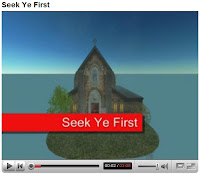 It uses images from Second Life in a Christian music video. I watched, curious about how denominations are being represented ... (Can you tell which is presented by the images offered?) Initially, I was impressed by the Cathedral's re-creation, then I reacted to what seemed like a marketplace for religious articifacts embedded at the end.... Wondering what significance those images held, I followed the link at the end http://www.peacebella.com/.
It uses images from Second Life in a Christian music video. I watched, curious about how denominations are being represented ... (Can you tell which is presented by the images offered?) Initially, I was impressed by the Cathedral's re-creation, then I reacted to what seemed like a marketplace for religious articifacts embedded at the end.... Wondering what significance those images held, I followed the link at the end http://www.peacebella.com/.I was struck by Peacebell'as description of her Second Life experience and her husband's activity online... there is an obvious tension in her writing about her husband's and society's emphasis on money... one of her sites is titled "money sick".... and the constrast she presents through her faith and beliefs throughout her sites, videos and writings... check the list of tags that make the words used most often the biggest.... as well as her site see http://www.peaceinspiration.com/faith/jesus-wisdomchristianity/
"Peacebella" is a pseudonym so we don't know who she is... http://www.peaceinspiration.com/about-me/
I keep wondering about the elements of her ecology that formed and fashioned her...


